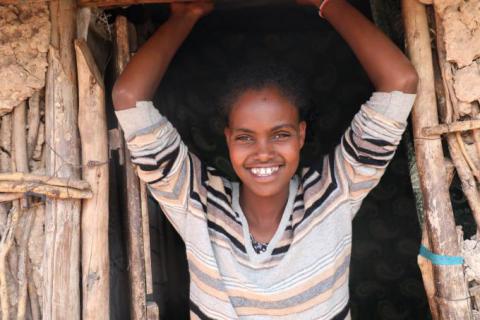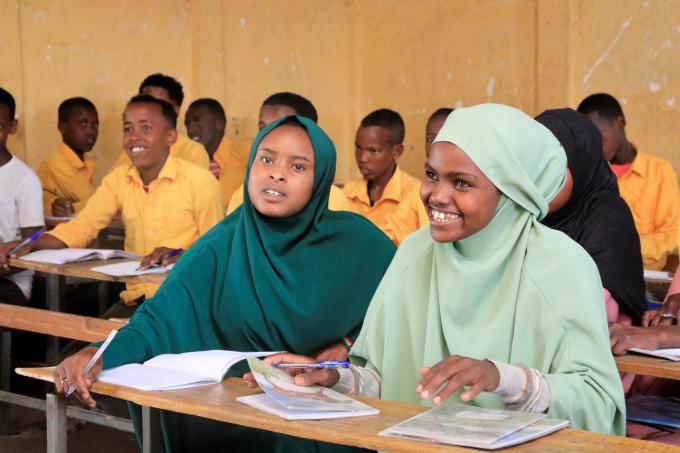“PEACE AND EDUCATION IS THE MOST IMPORTANT THING TO ACHIEVE OUR LIFE DREAMS”: ASMA’S STORY

Fifteen- year -old Asma is a grade seven student at Tuliguled primary school. She lives in Tuliguled village with her parents and three younger siblings. Every day, she wakes up early at 6:00 am. Before school, she prepares breakfast and fetches water. She goes to school with her three siblings 8:00 am. Asma likes her school. She is active in her class and serves as a class representative for seventh grade.
“I like all the subjects we learn at school. But my favorites are chemistry and biology classes. After I finish my chores at home, I enjoy reading those subjects” said Asma.
Asma’s family moved to Tuliguled village two years ago from Chinaksen Woreda of the Oromia region due to conflict. Her parents lost everything they have during the conflict and they do not have enough money to provide school materials for Asma and her siblings.
“We have received exercise books and pens. Girls my age have received dignity kits. All the support is important for us because our families cannot afford to provide it. Girls miss classes seven days per month because of their periods. The dignity kits will help us to come to school throughout the month” said Asma.
Asma was born and raised in Chinaksen Woreda about 20 km from Tuliguled Woreda of the Somali region. Her father was a dealer in the cattle market and her mother used to sell Khat. Her parents used to get additional income from renting some of the rooms of their house. In Chinaksen, her parents used to earn about 10,000 Birr per month (233 US dollars).
“Our life was good in Chinaksen until the conflict began three years ago. The men came to our community with guns, sticks, and other weapons. They attacked the entire village. During that time, my mother was in Jigjiga town. They came to our home and hit my father very badly. His wounds still hurt him very much. When they left our home, my father was bleeding a lot and could not walk. He told me to go with my siblings and look for help. We met with the government soldiers and they took us to Collechi camp. After a day, the soldiers brought my father. I was very happy to see him because I was worried that I might not see him again,” said Asma.
Asma’s family stayed in the Collechi camp for the displaced for a year. Then they were relocated to Tuligulad village by the government.
“In Tuliguled, life is very hard for our family. My parents do not have an income and we depend on government ration,” said Asma. Her father is still suffering from wounds and stays at home. Her mother collects firewood and sells it to the market, and makes a small amount of money to buy sugar, milk, and other items.
“Due to the conflict, three years of my life have passed without education. Now I went to focus on my education. When I finish school, I want to be a doctor. Because I believe that I have a passion to take care of people. I wish I could become a doctor soon so I can help my father. I think peace and education is the most important thing to achieve our dreams in life.” Said Asma.
In Tuliguled primary school, 926 students are attending primary and pre-primary school.

Mohammed Ahmed is Tuliguled Primary School Director. He says, “Asma is a courageous girl who wants to continue her school despite all the challenges in her life. I have met with her parents and advised them several times to send their kids to school. The psychosocial training provided by this program has helped us to treat children like Asma. As a father and teacher, I want to encourage girls like Asma to pursue their education. We are glad that the school feeding program has started in our school. It improves the attendance and class performance of children.”
Through the support from Education Cannot Wait facilitated Multi Year Resilience Program; Tuliguled primary school has started the school feeding program in May 2021. A water container will be installed soon at the school compound to provide clean drinking water for the children.
Hawa is a member of the parent and teachers association at Tuliguled primary school. She is also a member of the school feeding committee. Hawa works closely with parents and teachers to ensure school-aged children attend school, make sure the kids have all the necessary materials for school like school uniforms, exercise books, and pens, provide all the necessary support for single parents and orphans so the children continue school and check the quality of food served at school. Hawa said “We want girls like Asma to continue education. We teach parents to send their young girls to school and explain the harms of early marriage.”
Mohammed Muhamedin is Tuliguled Woreda’s Education Office Head. Mohammed said, “The ECW MYRP program is working closely with us to create education access for IDPs and host communities and increase school enrollment rates in five schools. In our Woreda, there are 24,000 registered school-aged children. From this number 10,204 children are IDPs. With the support of this program, we have conducted a ‘Back to School’ campaign. Through the campaign, we have managed to return more than 7,000 children to school. The challenge we have is most of the IDP families do not have a means of income. Due to this, the families move in search of work and the children will drop out of school again. It would be great if this program supported some income-generating schemes.”
In the Somali region, Internally Displaced Peoples (IDPs) have settled in 390 IDP camps and host communities in Afder, Dawa, Dollo, Erer, Fafan, Jarar, Korahey, Liban, Nigob, Shabelle, and Siti zones. The crises destroyed coping mechanisms and halted the development of
physical infrastructure and human resources necessary for the provision of social services, including education. With 41% of the IDP population being school-age children, there is an
enormous demand for education. Many of these children have either engaged in or been affected by the conflicts and hostilities prevalent in their areas of origin and continue to exist in fragile camp environments.
The Education Cannot Wait facilitated Multi Year Resilience Program (ECW MYRP) is a three-year program aiming to improve learning through equitable access, crisis-sensitive, and quality education for emergency-affected children including children living with disabilities. The required total budget is 165 million USD with a plan to implement in Afar, Amhara, Benishangul-Gumz, Harari, Oromia, SNNP, Somali, and Tigray regions. Currently, ECW MYRP is implemented though 27 million USD seed funding from Education Cannot Wait (ECW) initially focuses interventions on addressing the critical educational needs of 60,487 out of school-displaced children in 81 schools, 17 woredas of Amhara, Oromia, and Somali regions. Part of the seed money will support efforts to mobilize the funding gap of US$138 million needed for the whole program.

Save the Children, NRC, and OWDA are implementing ECW MYRP in Fafan, Dawa, Korahey, and Liben zones of the Somali region since the program implementation started in January 2021. The following are some of the achievements of the program in the Somali region.
- Psychosocial training was provided for teachers,
- School materials like exercise books and pens were distributed to the students,
- Girls received dignity kits in Goljano and Tuliguled Woreda,
- School feeding program has started in most targeted school,
- School feeding committees were established
- School WASH clubs were established to promote hygiene and sanitation
 Ethiopia
Ethiopia